|
|
|
Sort Order |
|
|
|
Items / Page
|
|
|
|
|
|
|
| Srl | Item |
| 1 |
ID:
096281
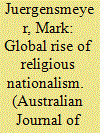

|
|
|
|
|
| Publication |
2010.
|
| Summary/Abstract |
The global rise of religious politics is found in every religious tradition, spurred on by the widespread perception that secular nationalism is an ineffective and insufficient expression of public values and moral community in a global era in which traditional forms of social identity and political accountability are radically transformed. Religious violence is an expression of this anti-secular protest and the symptom of a longing for a renewed sense of morality and values in public life.
|
|
|
|
|
|
|
|
|
|
|
|
|
|
|
|
| 2 |
ID:
096284
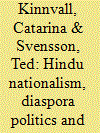

|
|
|
|
|
| Publication |
2010.
|
| Summary/Abstract |
This article proceeds from a critical reading of the role of religion for nation-building in India. In particular, the authors discuss how the Indian notion of secularism relies upon a number of religious legacies manifest in a Gandhian notion of what constitutes religious and political communities. Proceeding from this general picture, the authors examine how Hindu nationalists have used such legacies to enforce exclusionary practices by establishing certain hegemonic structures of rigid religious boundaries and practices with the aim of maintaining antagonistic movements within the Hindu fold. This, the authors argue, has been the case both among Hindu nationalists in India and among the widespread diaspora in Europe, Canada and the United States. Here, the authors critically evaluate a number of attempts to challenge these hegemonic structures in terms of secular and religious forces as well in terms of legalistic understandings of citizenship rights. It is argued that religion can and has played a positive role in Indian nation-building, but that Hindu nationalism has continuously reproduced exclusionary practices against other religious communities and worked against any forms of assimilatory processes.
|
|
|
|
|
|
|
|
|
|
|
|
|
|
|
|
| 3 |
ID:
096286
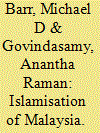

|
|
|
|
|
| Publication |
2010.
|
| Summary/Abstract |
The relationship between religious, ethnic and national identities in Malaysia has long been fraught with uncomfortable tensions-especially for the 50 percent of Malaysians who are outside the dominant Malay-Muslim communal grouping. Until the accession of Dr Mahathir to the prime ministership at the beginning of the 1980s, it was clear that ethnic identity trumped religious identity, even though being Muslim was already intrinsic to being accepted as Malay. Being a non-Malay Malaysian was to accept a subordinate, but not a drastically uncomfortable role in the nation. Since the 1980s, however, religious identity appears to have replaced ethnicity as the central element of nation identity as the society has been systematically-even aggressively-Islamised. Yet appearances can be deceiving, and there is a strong case to be made that Islamisation in Malaysia is basically a variation of the original Malay ethnonationalism, using the nearly complete symbiosis between Malay and Muslim identity as the point of articulation that allows religious nationalism to serve as a cipher for ethnonationalism-but a version of ethnonationalism that is much less accommodating of minorities than was traditional Malay nationalism. This article places contemporary events in a historical context and then focuses on just one aspect of Malaysia's program of Islamisation that is both contemporary and central to national identity-developments in the education system, and particularly within the secondary school history curriculum-to demonstrate that in this instance at least, religious nationalism is operating as a surrogate for ethnic nationalism and has, in fact, intensified ethnic nationalism by raising the stakes for the communities that are outside the core national group.
|
|
|
|
|
|
|
|
|
|
|
|
|
|
|
|
| 4 |
ID:
096291
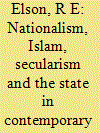

|
|
|
|
|
| Publication |
2010.
|
| Summary/Abstract |
This article seeks to explain the impact of Muslim politics on the Indonesian nation and, in particular, why Islamism has found so little political traction. It argues that Islamist ideas were late in emerging in modern Indonesia, and long remained marginal to Indonesians' ideas of what their nation should be and do. It notes, however, that Indonesia's deepening Islamisation has resulted in a sense of growing sectarianism and a developing accommodation of Islamic agendas by Indonesia's pseudo-secular state that requires careful management if respectful pluralism and mutual tolerance is to be maintained.
|
|
|
|
|
|
|
|
|
|
|
|
|
|
|
|
| 5 |
ID:
096288
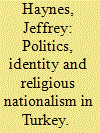

|
|
|
|
|
| Publication |
2010.
|
| Summary/Abstract |
Turkey has had an Islam-influenced government since a general election in 2002. The Justice and Development Party (Adalet ve KalkInma Partisi, abbreviated to AK Parti or AKP) won over a third of the popular vote and took power alone. A subsequent general election in 2007 saw the AKP win again with an improved 47 percent of votes cast. Over the last few years under the AKP, Turkey has often been noted for the 'moderation' of its Islam-influenced government, a positive example of the compatibility of Islam and democracy. The article focuses on Turkey's national identity and the place within it of Islam, secularism and the political role over time of the military, often judged to be the guardian of the country's secular national identity. This involves both a focus on the role and legacy of the country's nationalist founder, Mustafa Kemal Atat rk, and on the special insular and inward-looking self-selected guardian role of the military, long seen as central to national choices of the pursuit of a secular political path. The article argues that one of the defining characteristics of Turkish identity is not Islam or secularism per se. Rather, it is a pronounced, perhaps even xenophobic, fear of outsiders, including not only Westerners but also some Muslim non-Turks. The article suggests that while Islam is part of that sense of identity, it is not at its core. Moreover, if the military has its way, which at the moment seems likely, then Islam will never be allowed to be central to Turkey's sense of national identity.
|
|
|
|
|
|
|
|
|
|
|
|
|
|
|
|
| 6 |
ID:
096293


|
|
|
|
|
| Publication |
2010.
|
| Summary/Abstract |
On the surface, religious policy in China may appear contradictory. On the one hand, the state is officially atheist. It has mounted a highly publicised campaign to suppress Falun Gong, and maintains restrictions on Islam, Tibetan Buddhism and Christianity that reveal a profound fear of independent religious organisation. On the other, China insists that it respects religious freedom. The Chinese government proudly supports the staging of certain religious festivals, finances reconstruction of historic temples, and sponsors Chinese Muslims to visit Mecca. In fact, both tendencies are part of a consistent pattern of religious policy that seeks to establish firm political control over religious organisations, while visibly integrating religion into nation-building discourses. This same policy impulse applies to the treatment of both illegal and legal religions. Suppression of groups such as Falun Gong recreates the political theatre of earlier political campaigns, while support for ethnic religions and Christianity also allows the state to interpret religious ideology within a nationalist framework. In this regard, the most overt and successful ideological policy has been the state's sponsorship of Confucianism, which, unlike the other religions mentioned, has no existing organisation to overcome, and can thus be completely moulded to fit political needs.
|
|
|
|
|
|
|
|
|
|
|
|
|
|
|
|
| 7 |
ID:
096279
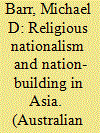

|
|
|
|
|
|
|
|